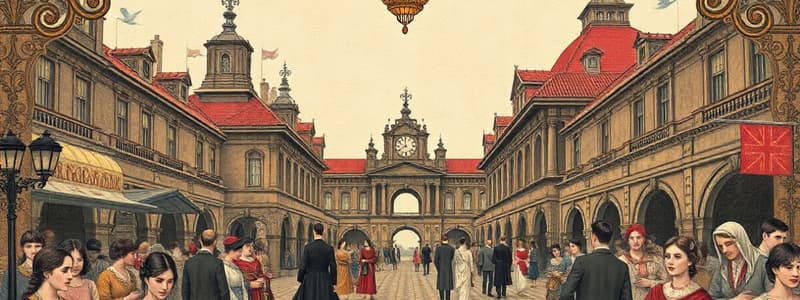Podcast
Questions and Answers
What is the primary goal of social studies?
What is the primary goal of social studies?
- To understand human societies past and present (correct)
- To study political structures exclusively
- To analyze geographical features only
- To focus solely on economic systems
Which key concept is NOT associated with historical analysis?
Which key concept is NOT associated with historical analysis?
- Scarcity (correct)
- Cause and effect
- Change
- Perspective
What does civics primarily examine?
What does civics primarily examine?
- The rights and responsibilities of citizens (correct)
- The physical features of the Earth
- Cultural norms and values
- Human social behavior
Which statement about geography is true?
Which statement about geography is true?
What does economics analyze?
What does economics analyze?
Which concept is primarily studied in sociology?
Which concept is primarily studied in sociology?
How are the disciplines within social studies interconnected?
How are the disciplines within social studies interconnected?
Which economic concept refers to the trade-off when choosing one option over another?
Which economic concept refers to the trade-off when choosing one option over another?
Flashcards
What is history?
What is history?
The study of past events, people and societies, using primary and secondary sources to understand the past.
Key concepts in history
Key concepts in history
History encompasses the study of change and continuity over time, exploring cause and effect, and analyzing how perspectives shape historical interpretations.
What does Civics focus on?
What does Civics focus on?
Examines the structure and function of governments and political systems, including the rights and responsibilities of citizens in a democracy. Important topics include justice, the rule of law, public policy, and elections.
What is Geography all about?
What is Geography all about?
Signup and view all the flashcards
What does Economics study?
What does Economics study?
Signup and view all the flashcards
What is the subject of Sociology?
What is the subject of Sociology?
Signup and view all the flashcards
How are social studies disciplines connected?
How are social studies disciplines connected?
Signup and view all the flashcards
Study Notes
Introduction to Social Studies
- Social studies is an interdisciplinary field of study.
- It encompasses history, civics, geography, economics, and sociology.
- The primary goal of social studies is to understand human societies past and present.
- It explores the interactions between individuals, groups, and institutions.
- It analyzes the factors that shape societies and cultures.
History
- History examines past events, people, and societies.
- It utilizes primary and secondary sources to reconstruct the past.
- Key historical concepts include change, continuity, cause and effect, and perspective.
- Historical analysis involves critical thinking and interpretation of evidence.
- Historical events are significant because they have consequences for present societies.
Civics
- Civics focuses on the structure and function of governments and political systems.
- It examines the rights and responsibilities of citizens.
- Core concepts include democracy, justice, and the rule of law.
- Civics also explores public policy, elections, and civic participation.
- Understanding the role of government in society is important for civic engagement.
Geography
- Geography studies the Earth's physical features and the human societies that inhabit them.
- It analyzes the spatial relationships between people, places, and environments.
- Key concepts include maps, location, place, region, and movement.
- Understanding geography helps analyze how people interact with their environments and how locations are related to each other.
Economics
- Economics studies the production, distribution, and consumption of goods and services.
- It examines how individuals and societies make decisions about resources.
- Key economic concepts include supply and demand, scarcity, and opportunity cost.
- Economics analyzes economic systems and their impact on societies.
- It explains how individuals and societies balance needs vs. wants.
Sociology
- Sociology analyzes human social behavior and relationships.
- It studies groups, institutions, and societies as a whole.
- Core sociological concepts delve into culture, social inequality, and social change.
- Sociologists focus on the relationship between individuals and society.
- The study of social interactions, structures, and institutions is important.
Interconnectedness of the Disciplines
- The disciplines of social studies are interconnected.
- Historical events have geographical consequences.
- Political systems shape economic structures.
- Societal norms influence cultural practices and historical narratives.
- Social studies helps understand the complex interplay of human experiences.
Studying That Suits You
Use AI to generate personalized quizzes and flashcards to suit your learning preferences.




